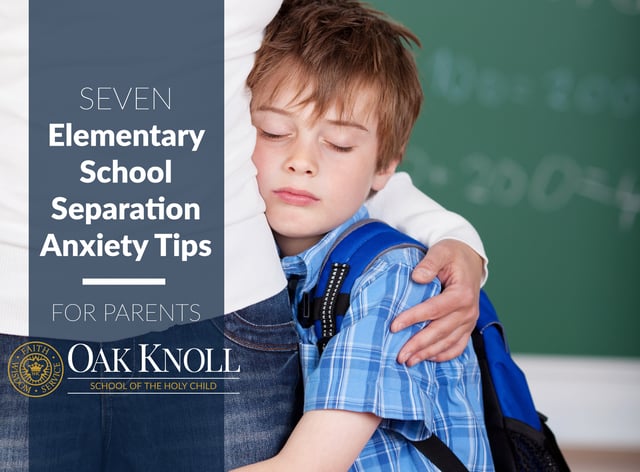The first few weeks of a new school year are always a time of adjustment and many students (and parents) feel a sense of separation anxiety, which is perfectly normal. Separation anxiety in children is often caused by fear of the unknown when it comes to a new situation or it can relate to something that is happening at home or to something that the child has just experienced before arriving at school. No matter what the cause, it is heart-wrenching to everyone involved. As teachers, we need to be able to nurture the child who is upset, provide support to the parents who feel like they are abandoning their child and also, help the other children feel at ease as they may start feeling anxious with seeing one of their classmates so distressed. As a parent of three, I have experienced my own share of back-to-school jitters and it is extremely challenging. It is one of the hardest things to deal with as a parent, and can be very stressful as a teacher as well. Below are a number of strategies I have developed to help parents along the way. Remember, elementary school separation anxiety is a phase; it is perfectly natural and it will pass.

Make the goodbye prompt and positive
This sounds easy, but can often be one of the most difficult things to do. Giving your child “one more minute” together simply prolongs the inevitable. As a parent, the best thing you can do is give your child a hug and kiss, say, “I love you,” and reassure him or her that you will be back soon.
Establish a goodbye routine
Preschoolers crave routine, and parents who establish a consistent goodbye routine usually have better luck with successful goodbyes. I have seen parents use a secret handshake with their child or a secret hand gesture. Other parents give their child a kiss on the forehead or offer a reassuring thumbs-up or rub noses with their child. By giving your child something he can count on, he is likely to go to school much more willingly and that special moment between the two of you is a great way to start the day and provide that sense of reassurance.
Trust your child's teacher
This may be difficult to do when you do not yet know your child’s teacher that well, but keep in mind that our teachers have chosen this profession because they love children and they have a wealth of ideas and strategies to help settle a child who is feeling upset. The strategies might involve anything from a nurturing hug, redirection, pairing them up with another student or simply keeping the child close until he/she is ready to engage with an activity. Ask your child's teacher to step in to help with goodbyes when you give the sign that you are ready to go.
Never sneak out on a child
As tempting as it is, sneaking out the door can make matters worse. Although you do not have to stay to witness a meltdown, it may be very upsetting for the child when they realize mom or dad has simply disappeared without saying goodbye and it can make the next day even more difficult. The best thing a parent can do is deal directly the situation and before you know it, the tearful goodbyes will be no more. Besides, you want your child to know unequivocally that he/she can trust you.
Do not linger
As a parent, I know how reassuring it can be to stay to peek at your child through the window. However, for the child, it can be pure torture. As a child, seeing your parent when you are upset, but not being able to be with your parent is not a good feeling. My suggestion to parents is to leave quickly and if you are feeling really uneasy, email the school in 15-20 minutes to ask how your child is doing. Chances are, he/she settled within a few minutes.
Stay calm and be enthusiastic
Modeling the appropriate behavior is key to a smooth transition from home to the classroom, so try very hard to ensure your child does not sense your anxiety. Talk about how much fun school will be, talk about her friends and classmates. Discuss the different works she might want to choose and reinforce how lucky she is to have such a special school and that you cannot wait to hear about her day when you pick her up.
Always be on time
Arriving late can often spark a meltdown. Arriving late can be upsetting to some children as the class has already. Give yourselves plenty of time in the morning. Children often get anxious when rushed, so do your best to give your child extra time in the morning to get ready and to arrive at school on time with the group. Additionally, it is important to be punctual when picking up your child. I know how easy it is to lose track of time, but no matter who is picking your child up, whether it is you or someone else, make sure you are there on time. If you are late, it can cause your child even more anxiety and make dropping her off the next time that much harder.
NOTE: Be prepared for regression
Just when you think your child has conquered his/her feelings of fear, along comes a weekend or an illness that keeps your child home for a few days and you are right back to square one. As frustrating and upsetting as this can be, it is perfectly normal. Stick to the above strategies and you should notice a significant difference in a couple of days.
Want bonus tips? Check out our free video:
Visit www.oakknoll.org to learn more about Oak Knoll.




